Tesco: Developing Individual Teams and Organisation Report
VerifiedAdded on 2020/07/23
|17
|4823
|34
Report
AI Summary
This report examines the critical skills required by HR professionals, emphasizing the importance of understanding individual behavior and employment laws. It includes a personal skill audit and professional development plan for an HR professional, highlighting strengths, weaknesses, and areas for improvement. The report also differentiates between organizational and individual learning, emphasizing the need for continuous professional development. Furthermore, it explores the contributions of High-Performance Work (HPW) systems to competitive advantage and employee engagement and delves into various approaches to performance management. The report uses Tesco as a case study to illustrate these concepts within a real-world business context, providing practical insights into HR practices and their impact on organizational success.
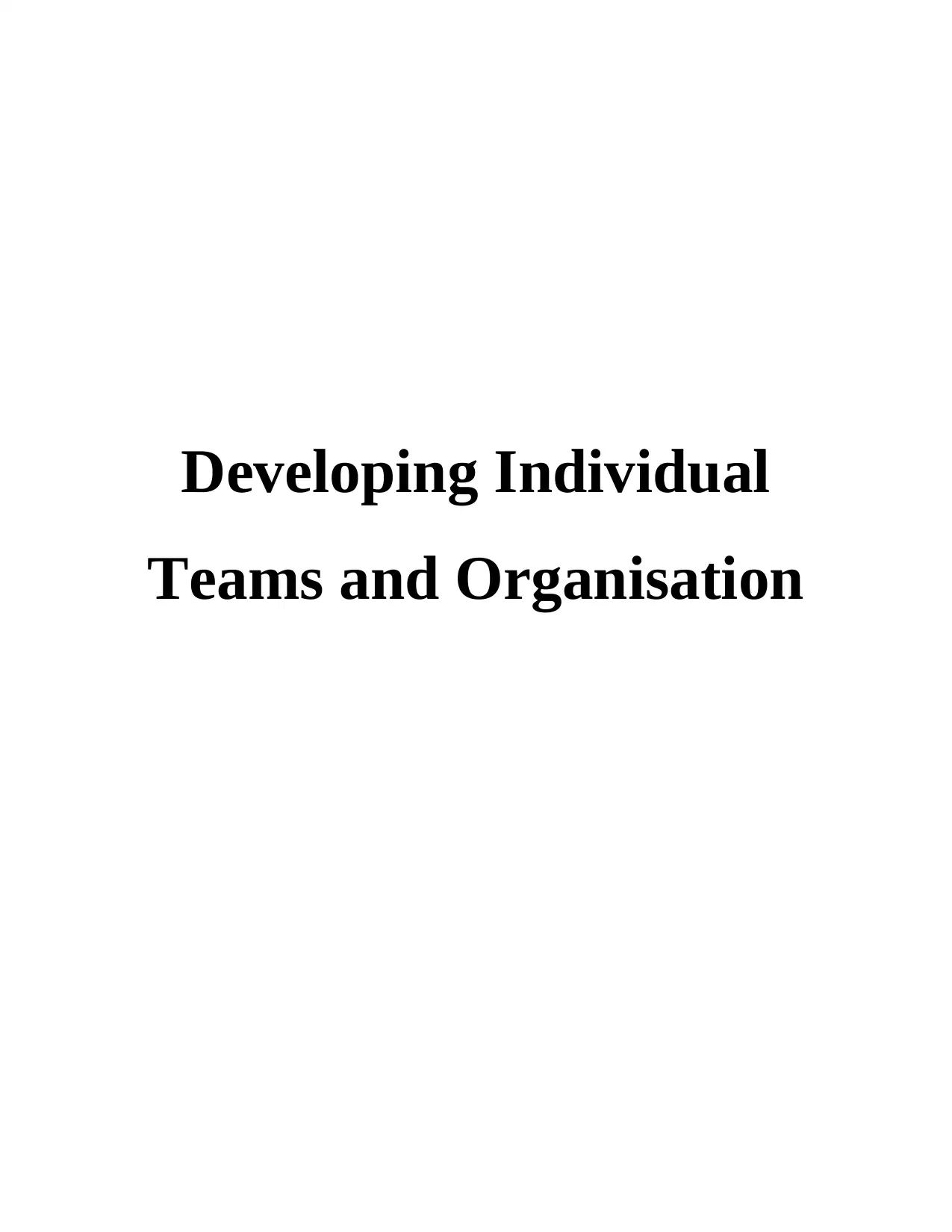
Developing Individual
Teams and Organisation
Teams and Organisation
Paraphrase This Document
Need a fresh take? Get an instant paraphrase of this document with our AI Paraphraser
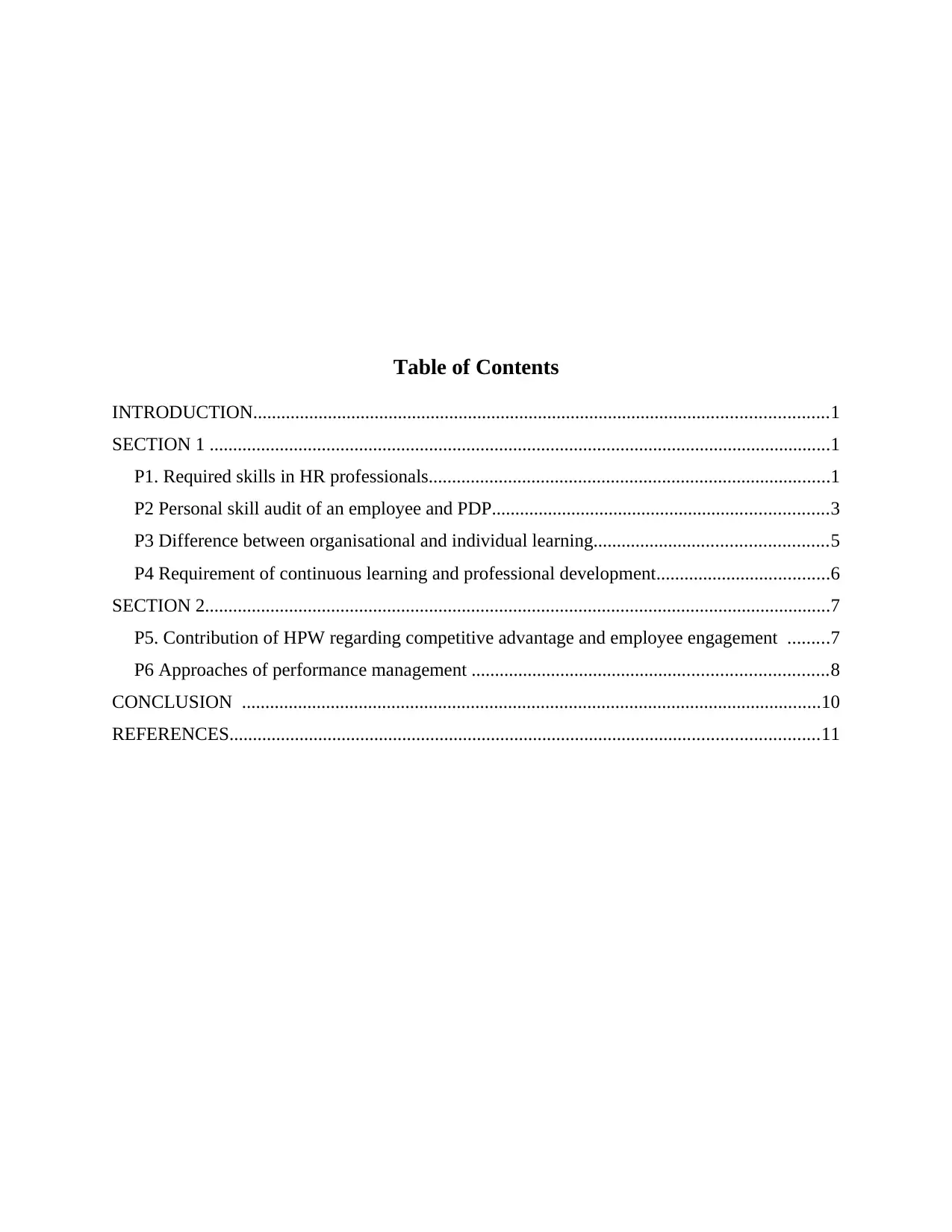
Table of Contents
INTRODUCTION...........................................................................................................................1
SECTION 1 .....................................................................................................................................1
P1. Required skills in HR professionals......................................................................................1
P2 Personal skill audit of an employee and PDP........................................................................3
P3 Difference between organisational and individual learning..................................................5
P4 Requirement of continuous learning and professional development.....................................6
SECTION 2......................................................................................................................................7
P5. Contribution of HPW regarding competitive advantage and employee engagement .........7
P6 Approaches of performance management ............................................................................8
CONCLUSION ............................................................................................................................10
REFERENCES..............................................................................................................................11
INTRODUCTION...........................................................................................................................1
SECTION 1 .....................................................................................................................................1
P1. Required skills in HR professionals......................................................................................1
P2 Personal skill audit of an employee and PDP........................................................................3
P3 Difference between organisational and individual learning..................................................5
P4 Requirement of continuous learning and professional development.....................................6
SECTION 2......................................................................................................................................7
P5. Contribution of HPW regarding competitive advantage and employee engagement .........7
P6 Approaches of performance management ............................................................................8
CONCLUSION ............................................................................................................................10
REFERENCES..............................................................................................................................11

⊘ This is a preview!⊘
Do you want full access?
Subscribe today to unlock all pages.

Trusted by 1+ million students worldwide
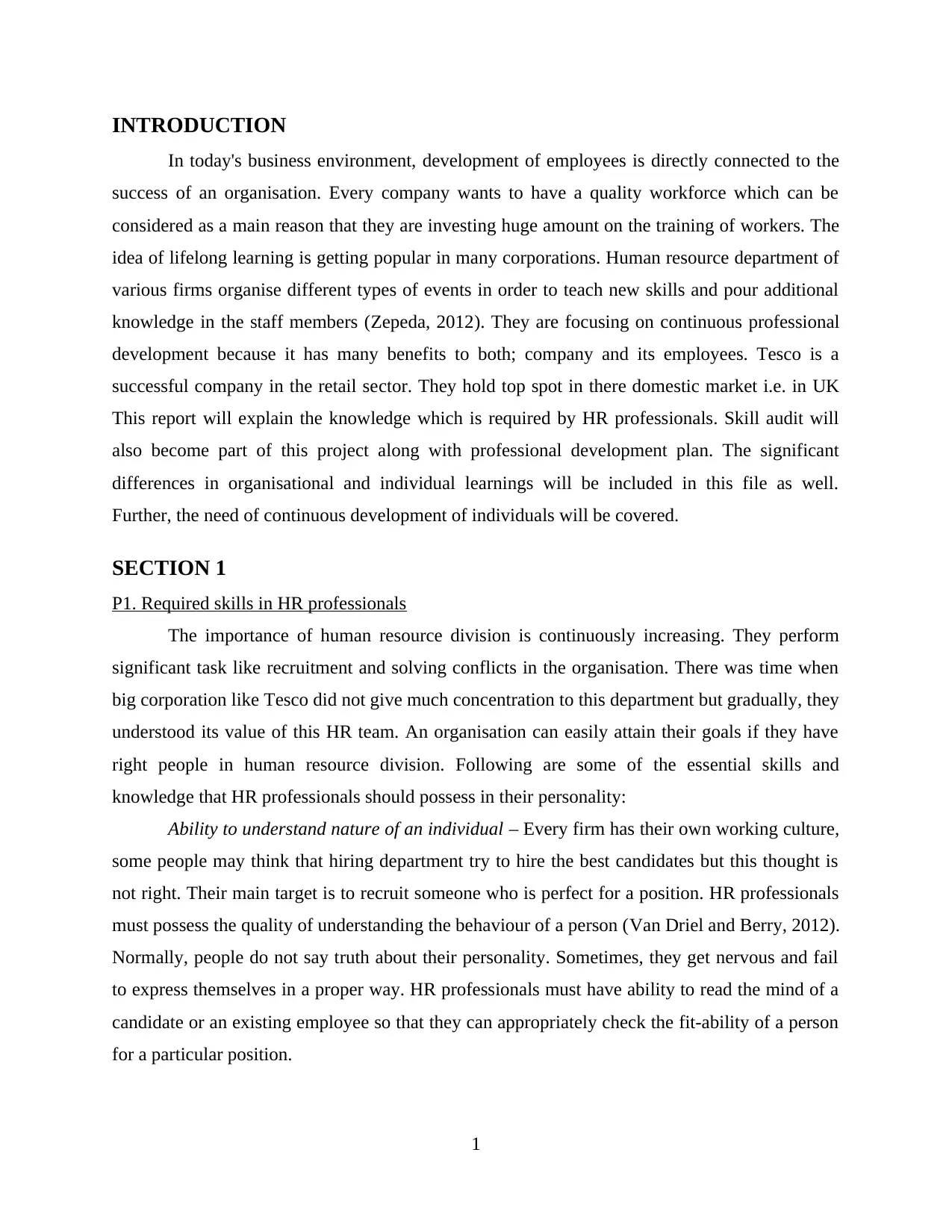
INTRODUCTION
In today's business environment, development of employees is directly connected to the
success of an organisation. Every company wants to have a quality workforce which can be
considered as a main reason that they are investing huge amount on the training of workers. The
idea of lifelong learning is getting popular in many corporations. Human resource department of
various firms organise different types of events in order to teach new skills and pour additional
knowledge in the staff members (Zepeda, 2012). They are focusing on continuous professional
development because it has many benefits to both; company and its employees. Tesco is a
successful company in the retail sector. They hold top spot in there domestic market i.e. in UK
This report will explain the knowledge which is required by HR professionals. Skill audit will
also become part of this project along with professional development plan. The significant
differences in organisational and individual learnings will be included in this file as well.
Further, the need of continuous development of individuals will be covered.
SECTION 1
P1. Required skills in HR professionals
The importance of human resource division is continuously increasing. They perform
significant task like recruitment and solving conflicts in the organisation. There was time when
big corporation like Tesco did not give much concentration to this department but gradually, they
understood its value of this HR team. An organisation can easily attain their goals if they have
right people in human resource division. Following are some of the essential skills and
knowledge that HR professionals should possess in their personality:
Ability to understand nature of an individual – Every firm has their own working culture,
some people may think that hiring department try to hire the best candidates but this thought is
not right. Their main target is to recruit someone who is perfect for a position. HR professionals
must possess the quality of understanding the behaviour of a person (Van Driel and Berry, 2012).
Normally, people do not say truth about their personality. Sometimes, they get nervous and fail
to express themselves in a proper way. HR professionals must have ability to read the mind of a
candidate or an existing employee so that they can appropriately check the fit-ability of a person
for a particular position.
1
In today's business environment, development of employees is directly connected to the
success of an organisation. Every company wants to have a quality workforce which can be
considered as a main reason that they are investing huge amount on the training of workers. The
idea of lifelong learning is getting popular in many corporations. Human resource department of
various firms organise different types of events in order to teach new skills and pour additional
knowledge in the staff members (Zepeda, 2012). They are focusing on continuous professional
development because it has many benefits to both; company and its employees. Tesco is a
successful company in the retail sector. They hold top spot in there domestic market i.e. in UK
This report will explain the knowledge which is required by HR professionals. Skill audit will
also become part of this project along with professional development plan. The significant
differences in organisational and individual learnings will be included in this file as well.
Further, the need of continuous development of individuals will be covered.
SECTION 1
P1. Required skills in HR professionals
The importance of human resource division is continuously increasing. They perform
significant task like recruitment and solving conflicts in the organisation. There was time when
big corporation like Tesco did not give much concentration to this department but gradually, they
understood its value of this HR team. An organisation can easily attain their goals if they have
right people in human resource division. Following are some of the essential skills and
knowledge that HR professionals should possess in their personality:
Ability to understand nature of an individual – Every firm has their own working culture,
some people may think that hiring department try to hire the best candidates but this thought is
not right. Their main target is to recruit someone who is perfect for a position. HR professionals
must possess the quality of understanding the behaviour of a person (Van Driel and Berry, 2012).
Normally, people do not say truth about their personality. Sometimes, they get nervous and fail
to express themselves in a proper way. HR professionals must have ability to read the mind of a
candidate or an existing employee so that they can appropriately check the fit-ability of a person
for a particular position.
1
Paraphrase This Document
Need a fresh take? Get an instant paraphrase of this document with our AI Paraphraser
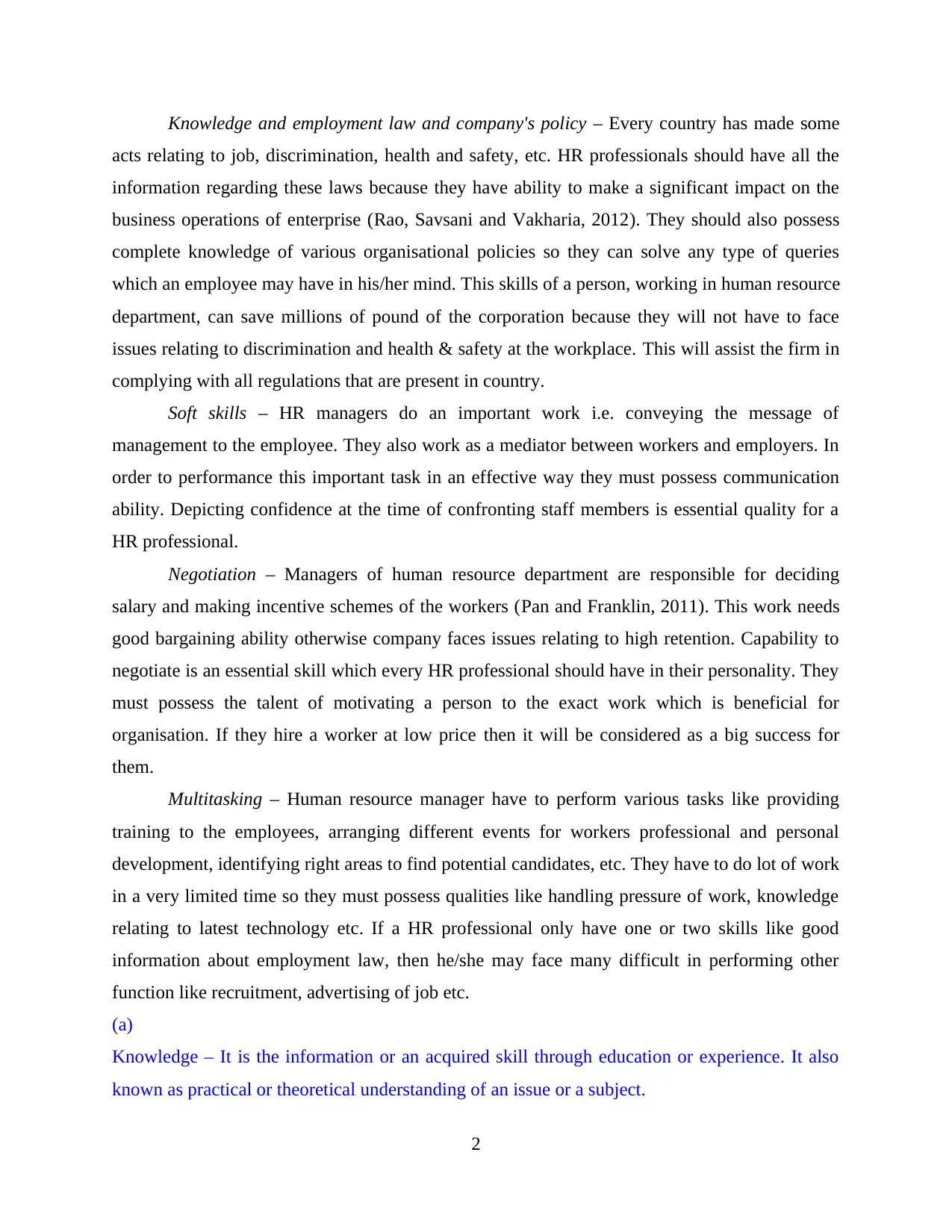
Knowledge and employment law and company's policy – Every country has made some
acts relating to job, discrimination, health and safety, etc. HR professionals should have all the
information regarding these laws because they have ability to make a significant impact on the
business operations of enterprise (Rao, Savsani and Vakharia, 2012). They should also possess
complete knowledge of various organisational policies so they can solve any type of queries
which an employee may have in his/her mind. This skills of a person, working in human resource
department, can save millions of pound of the corporation because they will not have to face
issues relating to discrimination and health & safety at the workplace. This will assist the firm in
complying with all regulations that are present in country.
Soft skills – HR managers do an important work i.e. conveying the message of
management to the employee. They also work as a mediator between workers and employers. In
order to performance this important task in an effective way they must possess communication
ability. Depicting confidence at the time of confronting staff members is essential quality for a
HR professional.
Negotiation – Managers of human resource department are responsible for deciding
salary and making incentive schemes of the workers (Pan and Franklin, 2011). This work needs
good bargaining ability otherwise company faces issues relating to high retention. Capability to
negotiate is an essential skill which every HR professional should have in their personality. They
must possess the talent of motivating a person to the exact work which is beneficial for
organisation. If they hire a worker at low price then it will be considered as a big success for
them.
Multitasking – Human resource manager have to perform various tasks like providing
training to the employees, arranging different events for workers professional and personal
development, identifying right areas to find potential candidates, etc. They have to do lot of work
in a very limited time so they must possess qualities like handling pressure of work, knowledge
relating to latest technology etc. If a HR professional only have one or two skills like good
information about employment law, then he/she may face many difficult in performing other
function like recruitment, advertising of job etc.
(a)
Knowledge – It is the information or an acquired skill through education or experience. It also
known as practical or theoretical understanding of an issue or a subject.
2
acts relating to job, discrimination, health and safety, etc. HR professionals should have all the
information regarding these laws because they have ability to make a significant impact on the
business operations of enterprise (Rao, Savsani and Vakharia, 2012). They should also possess
complete knowledge of various organisational policies so they can solve any type of queries
which an employee may have in his/her mind. This skills of a person, working in human resource
department, can save millions of pound of the corporation because they will not have to face
issues relating to discrimination and health & safety at the workplace. This will assist the firm in
complying with all regulations that are present in country.
Soft skills – HR managers do an important work i.e. conveying the message of
management to the employee. They also work as a mediator between workers and employers. In
order to performance this important task in an effective way they must possess communication
ability. Depicting confidence at the time of confronting staff members is essential quality for a
HR professional.
Negotiation – Managers of human resource department are responsible for deciding
salary and making incentive schemes of the workers (Pan and Franklin, 2011). This work needs
good bargaining ability otherwise company faces issues relating to high retention. Capability to
negotiate is an essential skill which every HR professional should have in their personality. They
must possess the talent of motivating a person to the exact work which is beneficial for
organisation. If they hire a worker at low price then it will be considered as a big success for
them.
Multitasking – Human resource manager have to perform various tasks like providing
training to the employees, arranging different events for workers professional and personal
development, identifying right areas to find potential candidates, etc. They have to do lot of work
in a very limited time so they must possess qualities like handling pressure of work, knowledge
relating to latest technology etc. If a HR professional only have one or two skills like good
information about employment law, then he/she may face many difficult in performing other
function like recruitment, advertising of job etc.
(a)
Knowledge – It is the information or an acquired skill through education or experience. It also
known as practical or theoretical understanding of an issue or a subject.
2
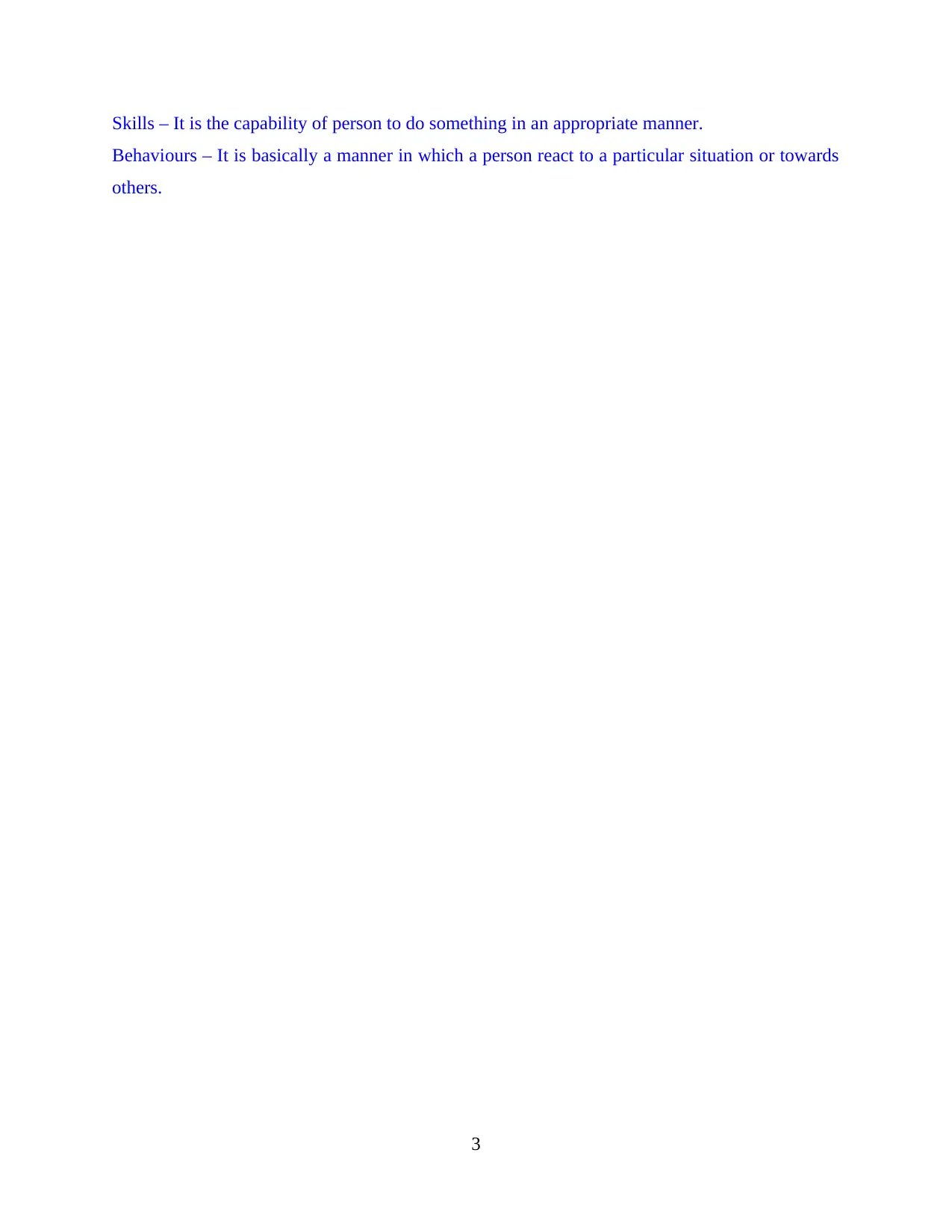
Skills – It is the capability of person to do something in an appropriate manner.
Behaviours – It is basically a manner in which a person react to a particular situation or towards
others.
3
Behaviours – It is basically a manner in which a person react to a particular situation or towards
others.
3
⊘ This is a preview!⊘
Do you want full access?
Subscribe today to unlock all pages.

Trusted by 1+ million students worldwide
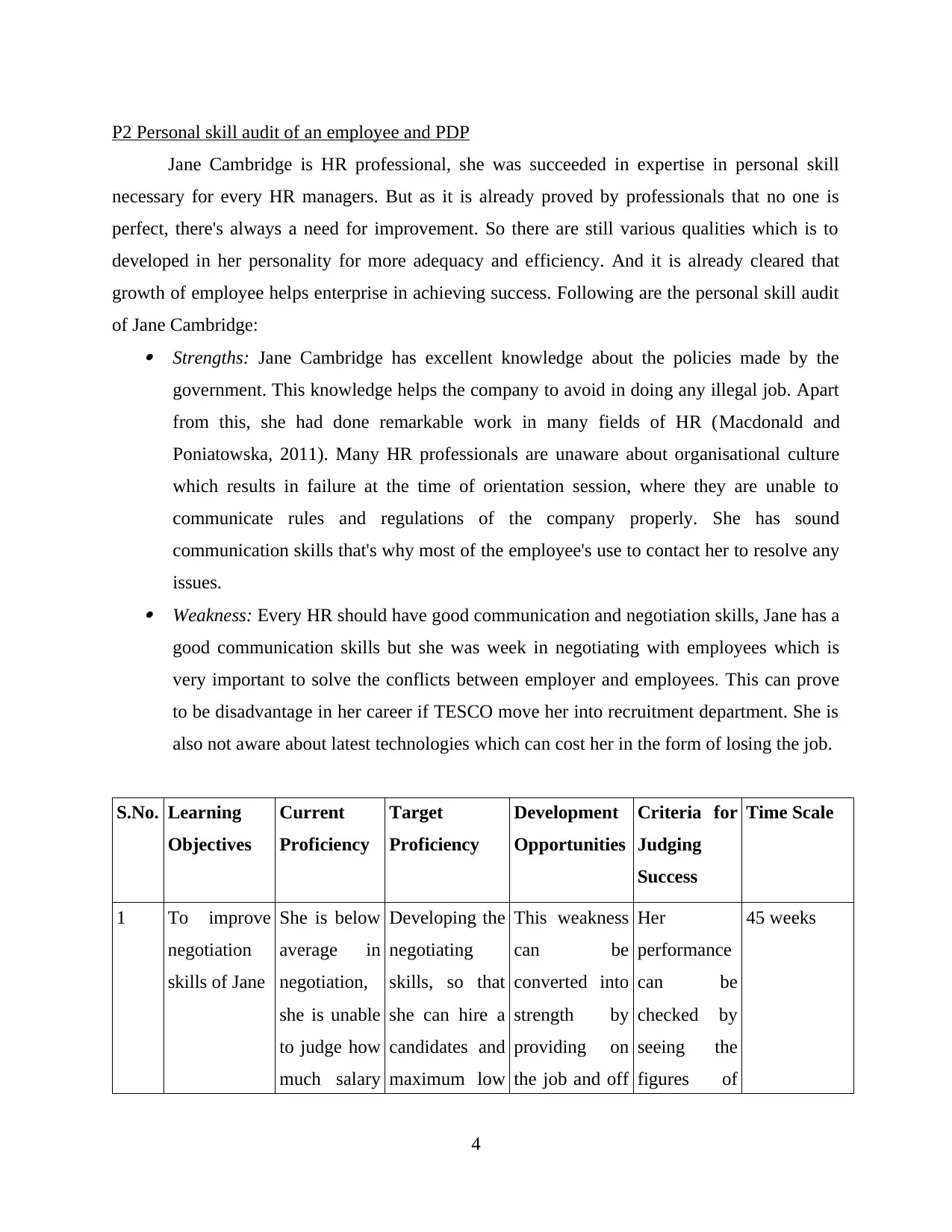
P2 Personal skill audit of an employee and PDP
Jane Cambridge is HR professional, she was succeeded in expertise in personal skill
necessary for every HR managers. But as it is already proved by professionals that no one is
perfect, there's always a need for improvement. So there are still various qualities which is to
developed in her personality for more adequacy and efficiency. And it is already cleared that
growth of employee helps enterprise in achieving success. Following are the personal skill audit
of Jane Cambridge: Strengths: Jane Cambridge has excellent knowledge about the policies made by the
government. This knowledge helps the company to avoid in doing any illegal job. Apart
from this, she had done remarkable work in many fields of HR (Macdonald and
Poniatowska, 2011). Many HR professionals are unaware about organisational culture
which results in failure at the time of orientation session, where they are unable to
communicate rules and regulations of the company properly. She has sound
communication skills that's why most of the employee's use to contact her to resolve any
issues. Weakness: Every HR should have good communication and negotiation skills, Jane has a
good communication skills but she was week in negotiating with employees which is
very important to solve the conflicts between employer and employees. This can prove
to be disadvantage in her career if TESCO move her into recruitment department. She is
also not aware about latest technologies which can cost her in the form of losing the job.
S.No. Learning
Objectives
Current
Proficiency
Target
Proficiency
Development
Opportunities
Criteria for
Judging
Success
Time Scale
1 To improve
negotiation
skills of Jane
She is below
average in
negotiation,
she is unable
to judge how
much salary
Developing the
negotiating
skills, so that
she can hire a
candidates and
maximum low
This weakness
can be
converted into
strength by
providing on
the job and off
Her
performance
can be
checked by
seeing the
figures of
45 weeks
4
Jane Cambridge is HR professional, she was succeeded in expertise in personal skill
necessary for every HR managers. But as it is already proved by professionals that no one is
perfect, there's always a need for improvement. So there are still various qualities which is to
developed in her personality for more adequacy and efficiency. And it is already cleared that
growth of employee helps enterprise in achieving success. Following are the personal skill audit
of Jane Cambridge: Strengths: Jane Cambridge has excellent knowledge about the policies made by the
government. This knowledge helps the company to avoid in doing any illegal job. Apart
from this, she had done remarkable work in many fields of HR (Macdonald and
Poniatowska, 2011). Many HR professionals are unaware about organisational culture
which results in failure at the time of orientation session, where they are unable to
communicate rules and regulations of the company properly. She has sound
communication skills that's why most of the employee's use to contact her to resolve any
issues. Weakness: Every HR should have good communication and negotiation skills, Jane has a
good communication skills but she was week in negotiating with employees which is
very important to solve the conflicts between employer and employees. This can prove
to be disadvantage in her career if TESCO move her into recruitment department. She is
also not aware about latest technologies which can cost her in the form of losing the job.
S.No. Learning
Objectives
Current
Proficiency
Target
Proficiency
Development
Opportunities
Criteria for
Judging
Success
Time Scale
1 To improve
negotiation
skills of Jane
She is below
average in
negotiation,
she is unable
to judge how
much salary
Developing the
negotiating
skills, so that
she can hire a
candidates and
maximum low
This weakness
can be
converted into
strength by
providing on
the job and off
Her
performance
can be
checked by
seeing the
figures of
45 weeks
4
Paraphrase This Document
Need a fresh take? Get an instant paraphrase of this document with our AI Paraphraser
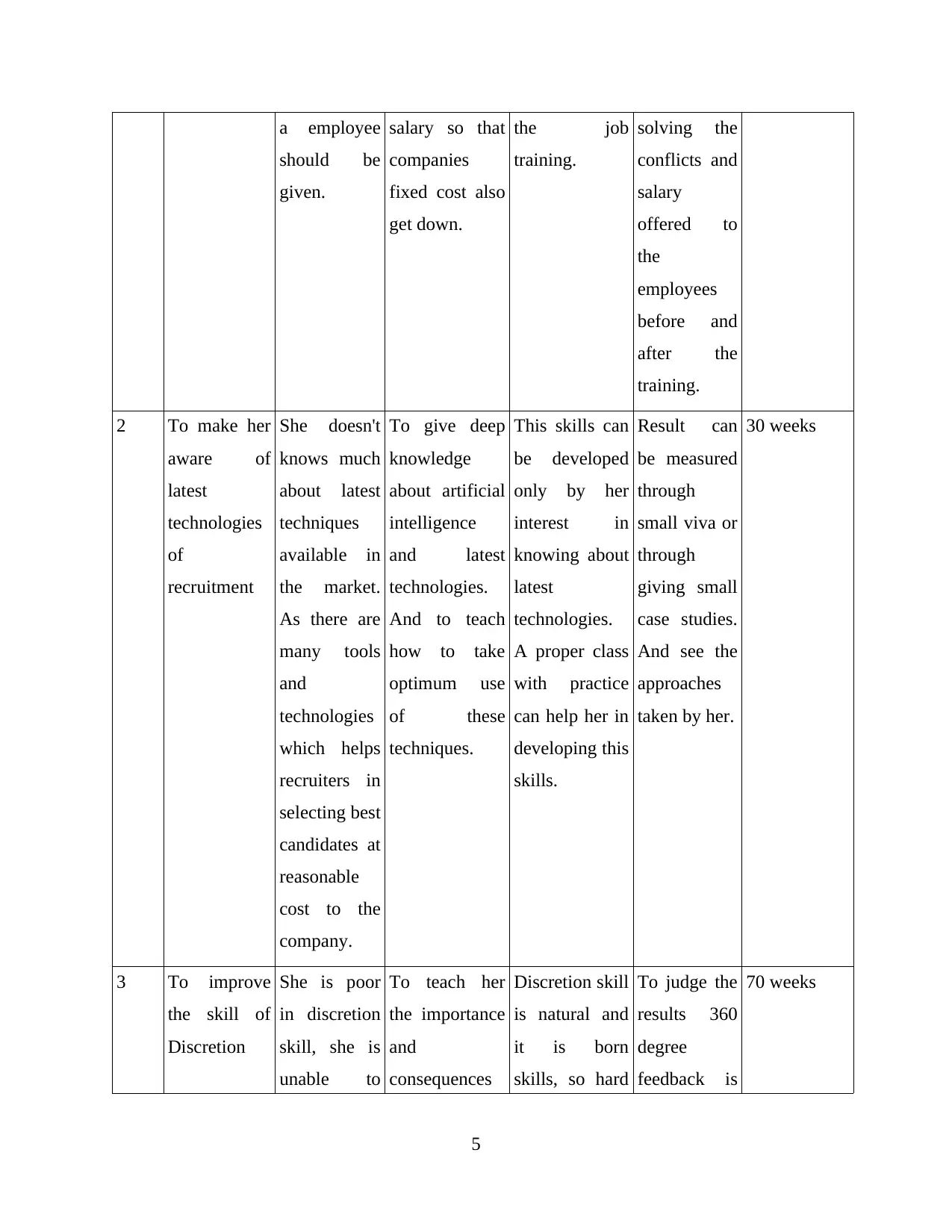
a employee
should be
given.
salary so that
companies
fixed cost also
get down.
the job
training.
solving the
conflicts and
salary
offered to
the
employees
before and
after the
training.
2 To make her
aware of
latest
technologies
of
recruitment
She doesn't
knows much
about latest
techniques
available in
the market.
As there are
many tools
and
technologies
which helps
recruiters in
selecting best
candidates at
reasonable
cost to the
company.
To give deep
knowledge
about artificial
intelligence
and latest
technologies.
And to teach
how to take
optimum use
of these
techniques.
This skills can
be developed
only by her
interest in
knowing about
latest
technologies.
A proper class
with practice
can help her in
developing this
skills.
Result can
be measured
through
small viva or
through
giving small
case studies.
And see the
approaches
taken by her.
30 weeks
3 To improve
the skill of
Discretion
She is poor
in discretion
skill, she is
unable to
To teach her
the importance
and
consequences
Discretion skill
is natural and
it is born
skills, so hard
To judge the
results 360
degree
feedback is
70 weeks
5
should be
given.
salary so that
companies
fixed cost also
get down.
the job
training.
solving the
conflicts and
salary
offered to
the
employees
before and
after the
training.
2 To make her
aware of
latest
technologies
of
recruitment
She doesn't
knows much
about latest
techniques
available in
the market.
As there are
many tools
and
technologies
which helps
recruiters in
selecting best
candidates at
reasonable
cost to the
company.
To give deep
knowledge
about artificial
intelligence
and latest
technologies.
And to teach
how to take
optimum use
of these
techniques.
This skills can
be developed
only by her
interest in
knowing about
latest
technologies.
A proper class
with practice
can help her in
developing this
skills.
Result can
be measured
through
small viva or
through
giving small
case studies.
And see the
approaches
taken by her.
30 weeks
3 To improve
the skill of
Discretion
She is poor
in discretion
skill, she is
unable to
To teach her
the importance
and
consequences
Discretion skill
is natural and
it is born
skills, so hard
To judge the
results 360
degree
feedback is
70 weeks
5
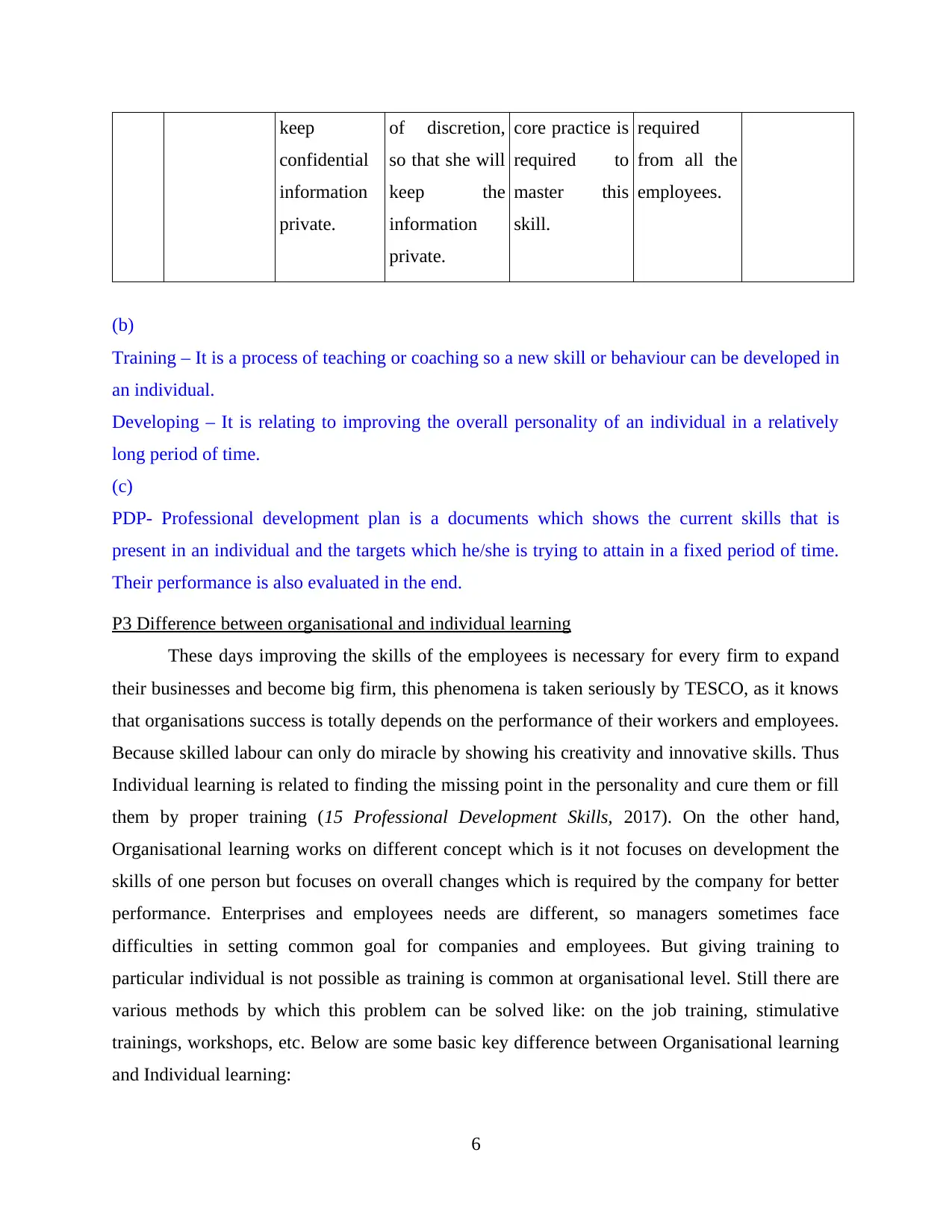
keep
confidential
information
private.
of discretion,
so that she will
keep the
information
private.
core practice is
required to
master this
skill.
required
from all the
employees.
(b)
Training – It is a process of teaching or coaching so a new skill or behaviour can be developed in
an individual.
Developing – It is relating to improving the overall personality of an individual in a relatively
long period of time.
(c)
PDP- Professional development plan is a documents which shows the current skills that is
present in an individual and the targets which he/she is trying to attain in a fixed period of time.
Their performance is also evaluated in the end.
P3 Difference between organisational and individual learning
These days improving the skills of the employees is necessary for every firm to expand
their businesses and become big firm, this phenomena is taken seriously by TESCO, as it knows
that organisations success is totally depends on the performance of their workers and employees.
Because skilled labour can only do miracle by showing his creativity and innovative skills. Thus
Individual learning is related to finding the missing point in the personality and cure them or fill
them by proper training (15 Professional Development Skills, 2017). On the other hand,
Organisational learning works on different concept which is it not focuses on development the
skills of one person but focuses on overall changes which is required by the company for better
performance. Enterprises and employees needs are different, so managers sometimes face
difficulties in setting common goal for companies and employees. But giving training to
particular individual is not possible as training is common at organisational level. Still there are
various methods by which this problem can be solved like: on the job training, stimulative
trainings, workshops, etc. Below are some basic key difference between Organisational learning
and Individual learning:
6
confidential
information
private.
of discretion,
so that she will
keep the
information
private.
core practice is
required to
master this
skill.
required
from all the
employees.
(b)
Training – It is a process of teaching or coaching so a new skill or behaviour can be developed in
an individual.
Developing – It is relating to improving the overall personality of an individual in a relatively
long period of time.
(c)
PDP- Professional development plan is a documents which shows the current skills that is
present in an individual and the targets which he/she is trying to attain in a fixed period of time.
Their performance is also evaluated in the end.
P3 Difference between organisational and individual learning
These days improving the skills of the employees is necessary for every firm to expand
their businesses and become big firm, this phenomena is taken seriously by TESCO, as it knows
that organisations success is totally depends on the performance of their workers and employees.
Because skilled labour can only do miracle by showing his creativity and innovative skills. Thus
Individual learning is related to finding the missing point in the personality and cure them or fill
them by proper training (15 Professional Development Skills, 2017). On the other hand,
Organisational learning works on different concept which is it not focuses on development the
skills of one person but focuses on overall changes which is required by the company for better
performance. Enterprises and employees needs are different, so managers sometimes face
difficulties in setting common goal for companies and employees. But giving training to
particular individual is not possible as training is common at organisational level. Still there are
various methods by which this problem can be solved like: on the job training, stimulative
trainings, workshops, etc. Below are some basic key difference between Organisational learning
and Individual learning:
6
⊘ This is a preview!⊘
Do you want full access?
Subscribe today to unlock all pages.

Trusted by 1+ million students worldwide
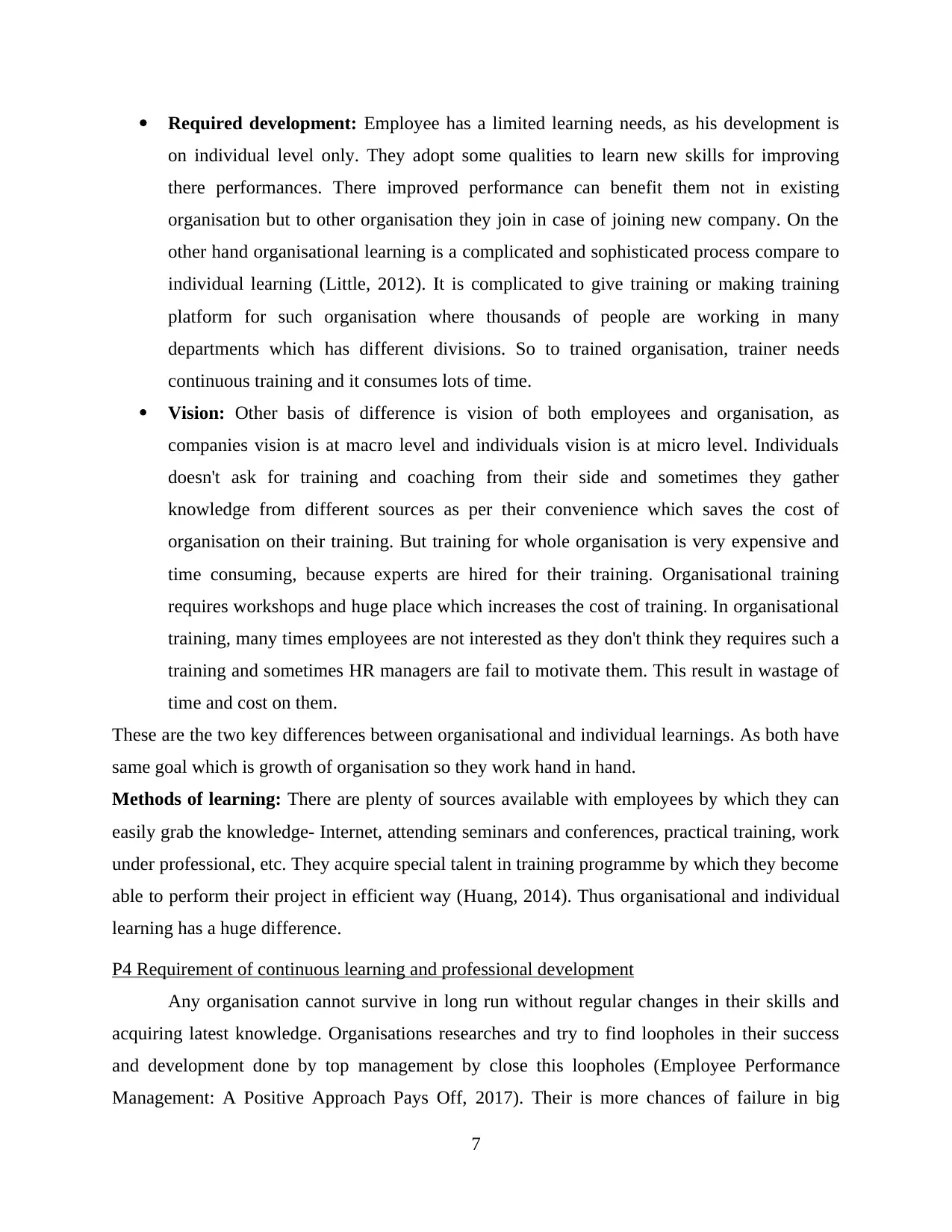
Required development: Employee has a limited learning needs, as his development is
on individual level only. They adopt some qualities to learn new skills for improving
there performances. There improved performance can benefit them not in existing
organisation but to other organisation they join in case of joining new company. On the
other hand organisational learning is a complicated and sophisticated process compare to
individual learning (Little, 2012). It is complicated to give training or making training
platform for such organisation where thousands of people are working in many
departments which has different divisions. So to trained organisation, trainer needs
continuous training and it consumes lots of time.
Vision: Other basis of difference is vision of both employees and organisation, as
companies vision is at macro level and individuals vision is at micro level. Individuals
doesn't ask for training and coaching from their side and sometimes they gather
knowledge from different sources as per their convenience which saves the cost of
organisation on their training. But training for whole organisation is very expensive and
time consuming, because experts are hired for their training. Organisational training
requires workshops and huge place which increases the cost of training. In organisational
training, many times employees are not interested as they don't think they requires such a
training and sometimes HR managers are fail to motivate them. This result in wastage of
time and cost on them.
These are the two key differences between organisational and individual learnings. As both have
same goal which is growth of organisation so they work hand in hand.
Methods of learning: There are plenty of sources available with employees by which they can
easily grab the knowledge- Internet, attending seminars and conferences, practical training, work
under professional, etc. They acquire special talent in training programme by which they become
able to perform their project in efficient way (Huang, 2014). Thus organisational and individual
learning has a huge difference.
P4 Requirement of continuous learning and professional development
Any organisation cannot survive in long run without regular changes in their skills and
acquiring latest knowledge. Organisations researches and try to find loopholes in their success
and development done by top management by close this loopholes (Employee Performance
Management: A Positive Approach Pays Off, 2017). Their is more chances of failure in big
7
on individual level only. They adopt some qualities to learn new skills for improving
there performances. There improved performance can benefit them not in existing
organisation but to other organisation they join in case of joining new company. On the
other hand organisational learning is a complicated and sophisticated process compare to
individual learning (Little, 2012). It is complicated to give training or making training
platform for such organisation where thousands of people are working in many
departments which has different divisions. So to trained organisation, trainer needs
continuous training and it consumes lots of time.
Vision: Other basis of difference is vision of both employees and organisation, as
companies vision is at macro level and individuals vision is at micro level. Individuals
doesn't ask for training and coaching from their side and sometimes they gather
knowledge from different sources as per their convenience which saves the cost of
organisation on their training. But training for whole organisation is very expensive and
time consuming, because experts are hired for their training. Organisational training
requires workshops and huge place which increases the cost of training. In organisational
training, many times employees are not interested as they don't think they requires such a
training and sometimes HR managers are fail to motivate them. This result in wastage of
time and cost on them.
These are the two key differences between organisational and individual learnings. As both have
same goal which is growth of organisation so they work hand in hand.
Methods of learning: There are plenty of sources available with employees by which they can
easily grab the knowledge- Internet, attending seminars and conferences, practical training, work
under professional, etc. They acquire special talent in training programme by which they become
able to perform their project in efficient way (Huang, 2014). Thus organisational and individual
learning has a huge difference.
P4 Requirement of continuous learning and professional development
Any organisation cannot survive in long run without regular changes in their skills and
acquiring latest knowledge. Organisations researches and try to find loopholes in their success
and development done by top management by close this loopholes (Employee Performance
Management: A Positive Approach Pays Off, 2017). Their is more chances of failure in big
7
Paraphrase This Document
Need a fresh take? Get an instant paraphrase of this document with our AI Paraphraser
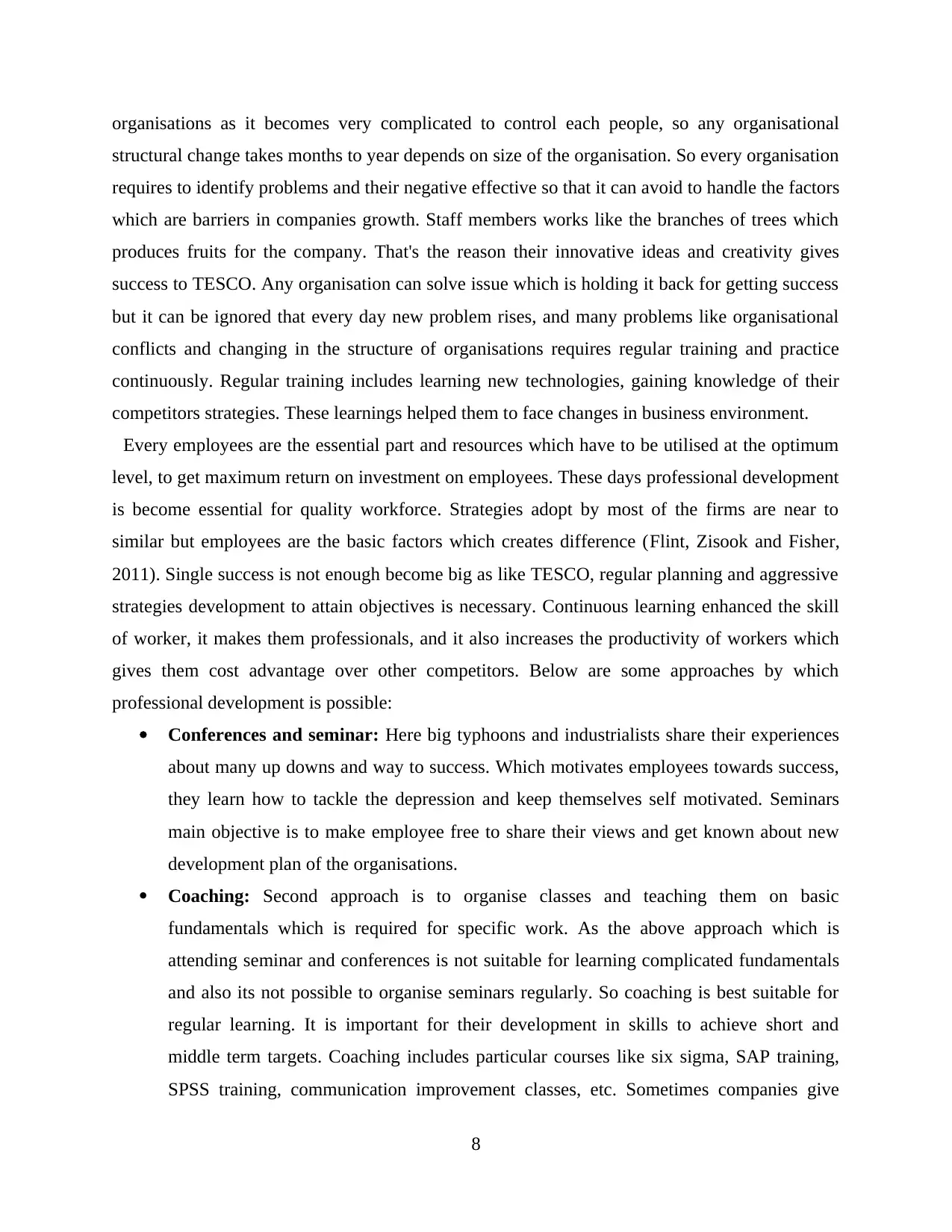
organisations as it becomes very complicated to control each people, so any organisational
structural change takes months to year depends on size of the organisation. So every organisation
requires to identify problems and their negative effective so that it can avoid to handle the factors
which are barriers in companies growth. Staff members works like the branches of trees which
produces fruits for the company. That's the reason their innovative ideas and creativity gives
success to TESCO. Any organisation can solve issue which is holding it back for getting success
but it can be ignored that every day new problem rises, and many problems like organisational
conflicts and changing in the structure of organisations requires regular training and practice
continuously. Regular training includes learning new technologies, gaining knowledge of their
competitors strategies. These learnings helped them to face changes in business environment.
Every employees are the essential part and resources which have to be utilised at the optimum
level, to get maximum return on investment on employees. These days professional development
is become essential for quality workforce. Strategies adopt by most of the firms are near to
similar but employees are the basic factors which creates difference (Flint, Zisook and Fisher,
2011). Single success is not enough become big as like TESCO, regular planning and aggressive
strategies development to attain objectives is necessary. Continuous learning enhanced the skill
of worker, it makes them professionals, and it also increases the productivity of workers which
gives them cost advantage over other competitors. Below are some approaches by which
professional development is possible:
Conferences and seminar: Here big typhoons and industrialists share their experiences
about many up downs and way to success. Which motivates employees towards success,
they learn how to tackle the depression and keep themselves self motivated. Seminars
main objective is to make employee free to share their views and get known about new
development plan of the organisations.
Coaching: Second approach is to organise classes and teaching them on basic
fundamentals which is required for specific work. As the above approach which is
attending seminar and conferences is not suitable for learning complicated fundamentals
and also its not possible to organise seminars regularly. So coaching is best suitable for
regular learning. It is important for their development in skills to achieve short and
middle term targets. Coaching includes particular courses like six sigma, SAP training,
SPSS training, communication improvement classes, etc. Sometimes companies give
8
structural change takes months to year depends on size of the organisation. So every organisation
requires to identify problems and their negative effective so that it can avoid to handle the factors
which are barriers in companies growth. Staff members works like the branches of trees which
produces fruits for the company. That's the reason their innovative ideas and creativity gives
success to TESCO. Any organisation can solve issue which is holding it back for getting success
but it can be ignored that every day new problem rises, and many problems like organisational
conflicts and changing in the structure of organisations requires regular training and practice
continuously. Regular training includes learning new technologies, gaining knowledge of their
competitors strategies. These learnings helped them to face changes in business environment.
Every employees are the essential part and resources which have to be utilised at the optimum
level, to get maximum return on investment on employees. These days professional development
is become essential for quality workforce. Strategies adopt by most of the firms are near to
similar but employees are the basic factors which creates difference (Flint, Zisook and Fisher,
2011). Single success is not enough become big as like TESCO, regular planning and aggressive
strategies development to attain objectives is necessary. Continuous learning enhanced the skill
of worker, it makes them professionals, and it also increases the productivity of workers which
gives them cost advantage over other competitors. Below are some approaches by which
professional development is possible:
Conferences and seminar: Here big typhoons and industrialists share their experiences
about many up downs and way to success. Which motivates employees towards success,
they learn how to tackle the depression and keep themselves self motivated. Seminars
main objective is to make employee free to share their views and get known about new
development plan of the organisations.
Coaching: Second approach is to organise classes and teaching them on basic
fundamentals which is required for specific work. As the above approach which is
attending seminar and conferences is not suitable for learning complicated fundamentals
and also its not possible to organise seminars regularly. So coaching is best suitable for
regular learning. It is important for their development in skills to achieve short and
middle term targets. Coaching includes particular courses like six sigma, SAP training,
SPSS training, communication improvement classes, etc. Sometimes companies give
8
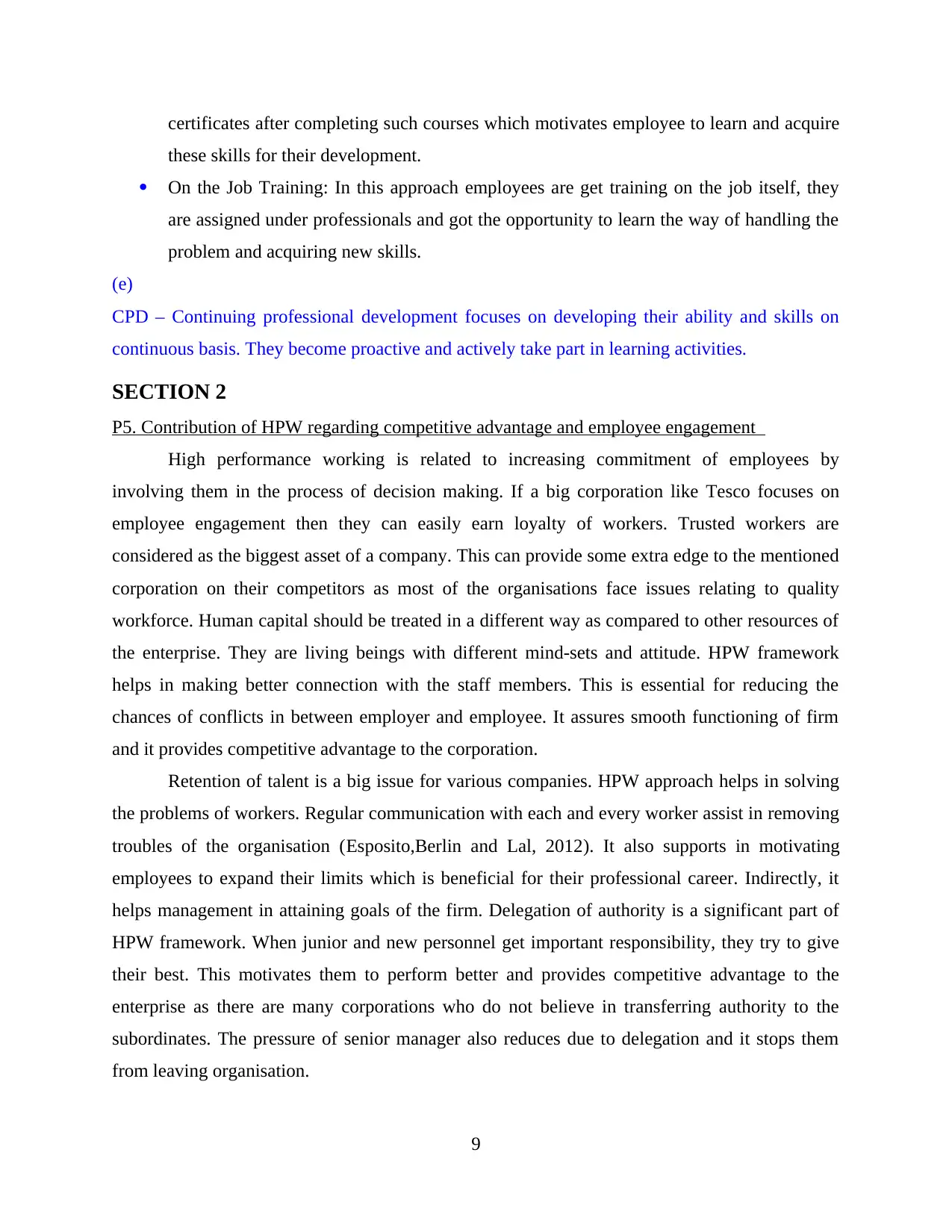
certificates after completing such courses which motivates employee to learn and acquire
these skills for their development.
On the Job Training: In this approach employees are get training on the job itself, they
are assigned under professionals and got the opportunity to learn the way of handling the
problem and acquiring new skills.
(e)
CPD – Continuing professional development focuses on developing their ability and skills on
continuous basis. They become proactive and actively take part in learning activities.
SECTION 2
P5. Contribution of HPW regarding competitive advantage and employee engagement
High performance working is related to increasing commitment of employees by
involving them in the process of decision making. If a big corporation like Tesco focuses on
employee engagement then they can easily earn loyalty of workers. Trusted workers are
considered as the biggest asset of a company. This can provide some extra edge to the mentioned
corporation on their competitors as most of the organisations face issues relating to quality
workforce. Human capital should be treated in a different way as compared to other resources of
the enterprise. They are living beings with different mind-sets and attitude. HPW framework
helps in making better connection with the staff members. This is essential for reducing the
chances of conflicts in between employer and employee. It assures smooth functioning of firm
and it provides competitive advantage to the corporation.
Retention of talent is a big issue for various companies. HPW approach helps in solving
the problems of workers. Regular communication with each and every worker assist in removing
troubles of the organisation (Esposito,Berlin and Lal, 2012). It also supports in motivating
employees to expand their limits which is beneficial for their professional career. Indirectly, it
helps management in attaining goals of the firm. Delegation of authority is a significant part of
HPW framework. When junior and new personnel get important responsibility, they try to give
their best. This motivates them to perform better and provides competitive advantage to the
enterprise as there are many corporations who do not believe in transferring authority to the
subordinates. The pressure of senior manager also reduces due to delegation and it stops them
from leaving organisation.
9
these skills for their development.
On the Job Training: In this approach employees are get training on the job itself, they
are assigned under professionals and got the opportunity to learn the way of handling the
problem and acquiring new skills.
(e)
CPD – Continuing professional development focuses on developing their ability and skills on
continuous basis. They become proactive and actively take part in learning activities.
SECTION 2
P5. Contribution of HPW regarding competitive advantage and employee engagement
High performance working is related to increasing commitment of employees by
involving them in the process of decision making. If a big corporation like Tesco focuses on
employee engagement then they can easily earn loyalty of workers. Trusted workers are
considered as the biggest asset of a company. This can provide some extra edge to the mentioned
corporation on their competitors as most of the organisations face issues relating to quality
workforce. Human capital should be treated in a different way as compared to other resources of
the enterprise. They are living beings with different mind-sets and attitude. HPW framework
helps in making better connection with the staff members. This is essential for reducing the
chances of conflicts in between employer and employee. It assures smooth functioning of firm
and it provides competitive advantage to the corporation.
Retention of talent is a big issue for various companies. HPW approach helps in solving
the problems of workers. Regular communication with each and every worker assist in removing
troubles of the organisation (Esposito,Berlin and Lal, 2012). It also supports in motivating
employees to expand their limits which is beneficial for their professional career. Indirectly, it
helps management in attaining goals of the firm. Delegation of authority is a significant part of
HPW framework. When junior and new personnel get important responsibility, they try to give
their best. This motivates them to perform better and provides competitive advantage to the
enterprise as there are many corporations who do not believe in transferring authority to the
subordinates. The pressure of senior manager also reduces due to delegation and it stops them
from leaving organisation.
9
⊘ This is a preview!⊘
Do you want full access?
Subscribe today to unlock all pages.

Trusted by 1+ million students worldwide
1 out of 17
Related Documents
Your All-in-One AI-Powered Toolkit for Academic Success.
+13062052269
info@desklib.com
Available 24*7 on WhatsApp / Email
![[object Object]](/_next/static/media/star-bottom.7253800d.svg)
Unlock your academic potential
Copyright © 2020–2026 A2Z Services. All Rights Reserved. Developed and managed by ZUCOL.





